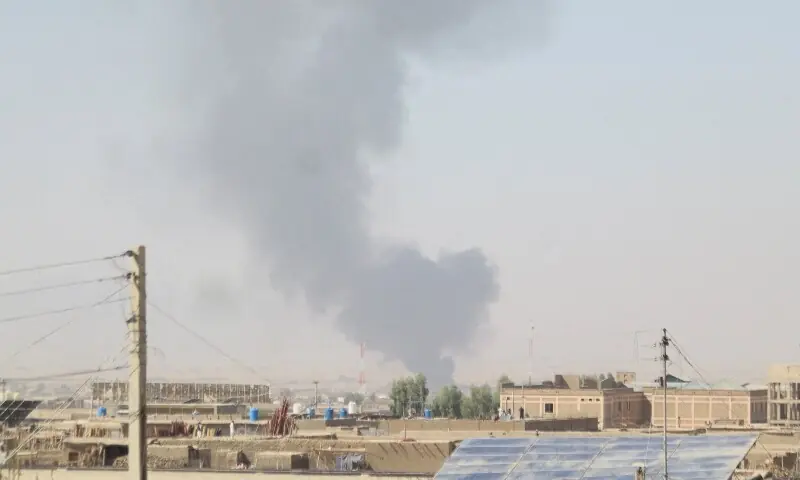China, Saudi Arabia and Iran on Thursday welcomed Pakistan and Afghanistan’s agreement to a 48-hour ceasefire after the two neighbors witnessed a new round of deadly cross-border clashes that threatened to escalate into a broader conflict.
China’s Foreign Ministry said today that it supports countries to exercise restraint and achieve a comprehensive and lasting ceasefire.
“China is willing to continue to play a constructive role in continuously improving relations between the two countries,” Foreign Ministry spokesperson Lin Jian said at a regular news conference.
Iran also welcomed the ceasefire between its eastern neighbors and urged dialogue and diplomacy after days of deadly clashes.
In a statement, Foreign Ministry spokesperson Esmaeil Baqaei expressed concern over civilian casualties and called for greater regional cooperation to combat terrorism, while reaffirming Tehran’s readiness “to assist in any efforts to maintain calm and reduce tensions between the two neighboring Muslim countries.”
Meanwhile, Foreign Minister and Deputy Prime Minister Ishaq Dar held a telephonic conversation with his Saudi Arabian counterpart Prince Faisal bin Farhan and held a discussion on the matter.
According to a statement by the Ministry of Foreign Affairs (FO), “His Highness Prince Faisal appreciated Pakistan’s commitment to peace and security in the region and emphasized the importance of collective efforts for stability.”
According to the statement, Foreign Minister Dar “expressed his gratitude for the Kingdom’s continued support” and also reaffirmed Pakistan’s determination to work closely with Saudi Arabia to further strengthen cooperation on regional and international issues.
Following the announcement of the ceasefire, Dar also received a message from Qatar’s Minister of State for Foreign Affairs, Dr. Abdulaziz Al-Khulaifi, who praised Pakistan’s “constructive engagement” in promoting regional peace.
On Wednesday, the Foreign Office (FO) said a temporary ceasefire had been agreed with Afghanistan for the next 48 hours amid recent border hostilities between the two countries.
“A temporary ceasefire has been decided between the Pakistani government and the Afghan Taliban regime, with the mutual consent of both parties, for the next 48 hours starting at 6:00 p.m. today, at the request of the Taliban.
“During this period, both sides will make sincere efforts to find a positive solution to this complex but solvable issue through constructive dialogue,” the FO said.
Taliban regime spokesman Zabiullah Mujahid said in X that Afghan forces were instructed to respect the ceasefire, “unless any aggression occurs.”
Pakistani officials on the northern and southern borders with Afghanistan said AFP that “no violence was reported overnight and the ceasefire remains in effect.”
Separately, United Nations human rights chief Volker Turk welcomed the ceasefire and appealed to “both sides to prevent further harm to civilians and commit to a lasting ceasefire,” according to AFP.
The announcement came after Pakistan’s military carried out “precision strikes” in Kandahar province and the Afghan capital, Kabul, according to state media. pay television reported.
Earlier in the day, the Inter-Services Public Relations (ISPR) had said that security forces repulsed a separate attack by the Afghan Taliban along the Balochistan border, killing between 15 and 20 of its members.
He said the Afghan Taliban “resorted to cowardly attacks[s] in four places [the] “In the Spin Boldak area” in the early hours of Wednesday. “The attack was effectively repulsed by Pakistani forces,” the statement said.
The fighting was the third major skirmish between Pakistan and Afghanistan in a week, following an incident in Kurram and earlier skirmishes that began on Saturday night and continued into Sunday morning at several locations.
Twenty-three Pakistani soldiers were martyred and 29 were injured in the incident that began when the Afghan Taliban attacked posts across the border, ISPR said.
Afghanistan claimed it carried out the attack as a “retaliation” measure, accusing Islamabad of carrying out airstrikes on its territory last week.
For its part, Islamabad did not confirm whether it was behind the airstrikes but stressed Pakistan’s right and determination to defend itself against terrorist groups like the TTP.
Islamabad has repeatedly called on Kabul to prohibit terrorist groups from using its territory to attack Pakistan; However, Afghanistan denies the allegations and claims that Afghan soil is not used for attacks against neighboring countries.
The issue of terrorists using Afghan soil against Pakistan has long strained ties between the two countries, and ties appear to have plummeted with the recent surge in border hostilities.








